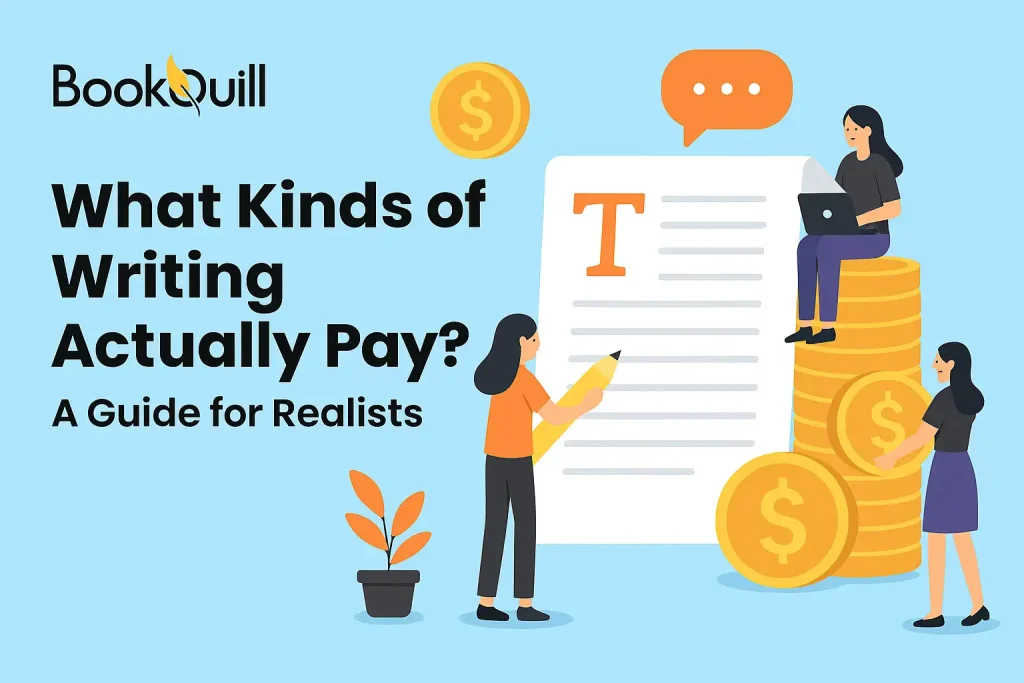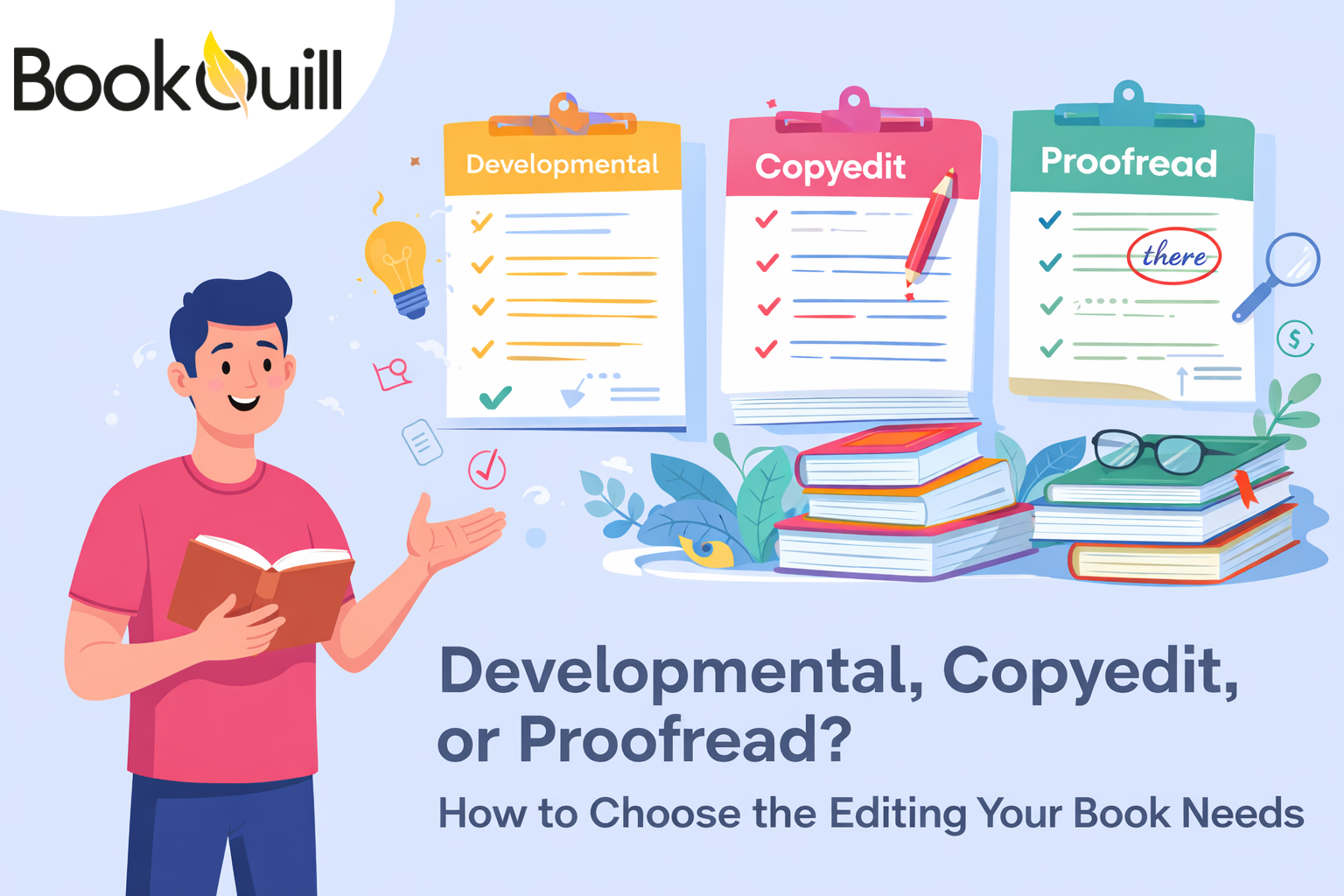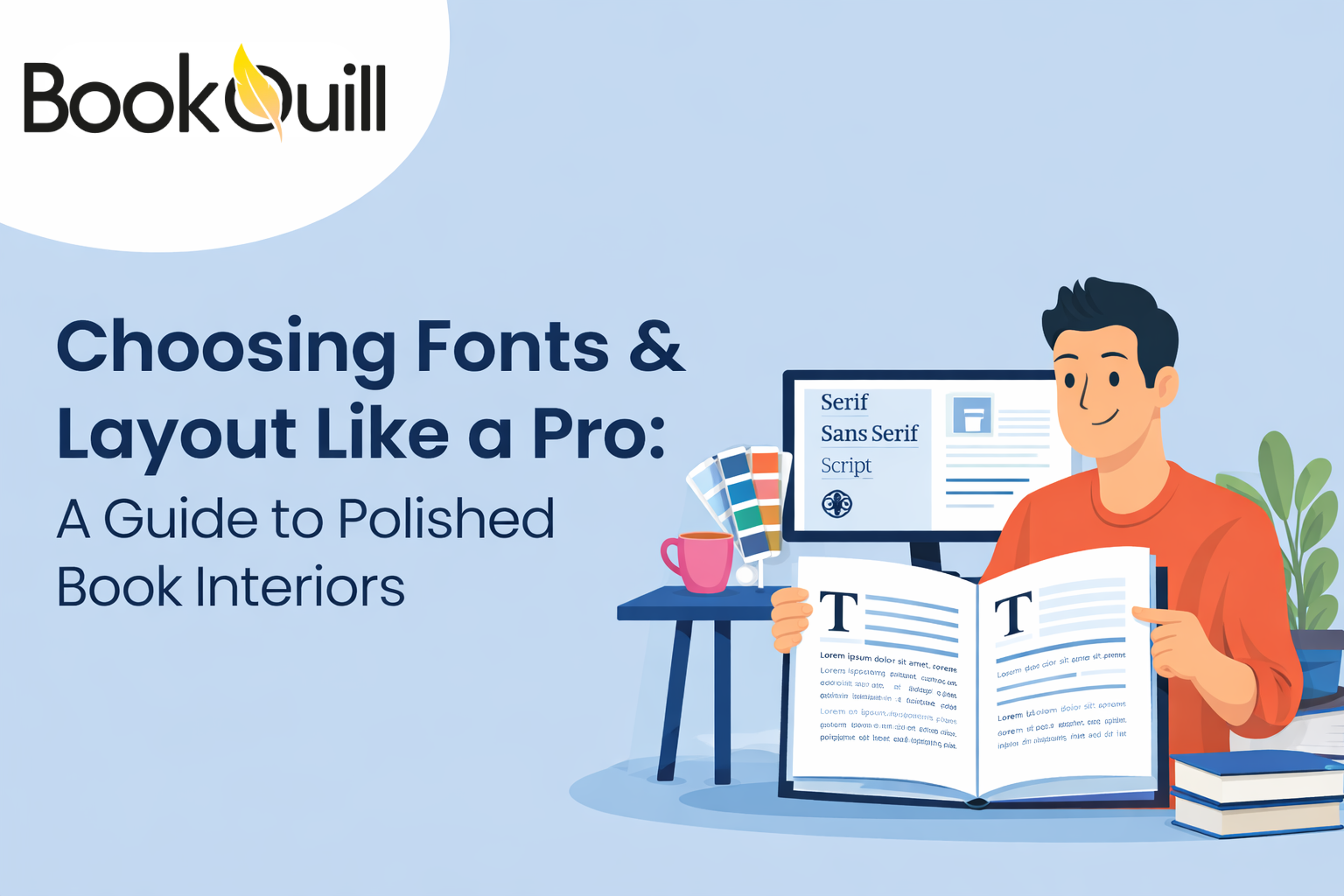Table of Contents
Explore Blogs
Trending on Ebook
What Kinds of Writing Actually Pay? A Guide for Realists

We all know the romantic version of being a writer. You know, sipping coffee in a café and furiously typing on a laptop. Cute, right?
This blog is for the realists, the writers who want to get paid to write. Because yes, how to make money as a writer is a real question with real answers. The internet’s flooded with vague clichés like “just follow your passion,” but passion alone won’t buy groceries. So today, we are going beyond the daydream and digging into actual and viable ways you can get paid to write articles, books, and more.
We’ll also explore one of the highest-paying corners of the writing world, i.e., book writing. Whether you write them, ghostwrite them, or support others through custom book writing help, there’s gold in those pages.
Key Takeaways
- Not All Writing Jobs Pay Well: So, it’s better to focus on high-demand niches like copywriting, content marketing, and ghostwriting to build income.
- Work with a Professional: Book writing, especially through ghostwriting or partnering with book writing services, offers some of the most rewarding opportunities.
- Diversify your Writing Income: How can you do that? With multiple streams like freelance gigs, consulting, publishing, and collaborations.
- Avoid Low-Paying Traps: Like content mills and “exposure” gigs, unless you’re using them strategically.
- Treat Writing like a Business: Real success comes from treating writing like a business, just make sure to combine passion with smart positioning, consistency, and client-driven work.
What Realist Writers Really Want?
Who is this guide really for? The realist writer.
They are people who want to turn their writing talent into a sustainable income. They want their words to matter and be paid for.
They’re also the kind of person who doesn’t want to be told “just blog more.” They want strategies. They want to know how to make money writing online, which shouldn’t pay two cents a word.
That’s where professional book writing services come in, especially for writers who love storytelling but hate sales calls. There are ways to partner with services, ghostwrite books, or support thought leaders in publishing, without sacrificing your creativity.
The Writing That Pays: What It Is and What It Isn’t
Let’s clear some things first. Not all writing pays! And not all paid writing pays well.
So what kinds of writing types actually make a lot of money? What are they? How much can they help you earn? Let’s discuss.
1. Copywriting
Think product descriptions, ad copy, and email funnels. Copywriting is where persuasion meets text, and the money follows. Mid-level copywriters often charge $25.77 per hour. Freelancers doing direct-response email campaigns can even earn five figures per project.
2. Content Writing
Blogs, SEO articles, guides. A great entry point for anyone asking how to get paid to write articles. Standard rates vary widely, from $0.10 to $1 per word.
3. Book Writing & Ghostwriting
Ghostwriting books for CEOs, coaches, and influencers can net you $10,000–$50,000 per project. And yes, services like ours offer premium book writing help that connects writers with clients looking for exactly this.
4. Technical Writing
Think manuals, whitepapers, and documentation. If you have a tech background, this niche pays exceptionally well.
5. Resume/LinkedIn Writing
Helping job seekers stand out. Quick turnaround, and strong writers can charge $100–$600 per resume package.
6. UX Writing
Write the words people see in apps, websites, and software. Fast-growing niche with salaried positions averaging $39 per hour in the U.S.
7. Creative Writing
Poetry, fiction, screenplays. Usually royalty-based or contest-based. Passion is fueled more than income security unless you strike it big.
Paid to Write: Where the Money Actually Is?
If your goal is consistent income, you’ve got to know where businesses and brands are investing in writers.
1. B2B Writing (Business to Business)
This is where the serious money flows. Businesses are constantly publishing blog posts, whitepapers, case studies, and guides. They need writers who understand SEO, tone, and structure. These jobs can bring in $500 to $2,000 per article, depending on expertise.
2. B2C Content
Writing product descriptions, marketing emails, and eBooks for direct-to-consumer brands. These pay slightly less but offer consistent volume and quick turnaround. Email copywriters are often on retainer, earning $1,000+ monthly.
3. Book Publishing & Ghostwriting
The big-ticket category. One book client can pay you more than ten blog clients combined. That’s why so many realist writers turn toward ghostwriting and why services like ours, offering affordable professional book writing services, are booming. We match experienced writers with clients who want high-quality books done for them.
Because honestly, not every entrepreneur or speaker wants to write 60,000 words. But they do want their story told, and they’re ready to pay for it.
Writing Books for a Living: The Route That Can Actually Pay Off
Let’s talk about book writing, arguably the most respected and yet misunderstood writing gig out there.
Why? Because everyone wants to write a book, but not everyone has the time, skill, or strategy to pull it off. That’s where professional book writers and ghostwriters help. If you know how to shape a narrative, manage timelines, and deliver clean copy, you could earn anywhere from $10,000–$50,000 per project.
Ghostwriting for executives, entrepreneurs, and thought leaders is a booming niche. They want to be authors, but they don’t want to write. What they do want is someone who can translate their story, expertise, or legacy into a publishable manuscript.
And here’s where custom professional book writing services can help. Whether you work as a solo ghostwriter or partner with a firm, you’re offering the best book-writing help to people who need their message out in the world but don’t know how to structure a story or finish a first draft.
And the best part? You don’t need a bestseller to succeed in this space. Many successful book writers operate behind the scenes, building six-figure incomes by helping others do what they can’t (or won’t) do themselves.
Be it memoirs, business books, legacy pieces, or thought-leadership content, the demand for quality books is real and growing.
Freelance vs. In-House: Where Should You Write?
One of the biggest decisions you’ll make as a paid writer is whether to go solo or salaried.
1. Freelance Writing
Freelancing offers flexibility, remote work, and unlimited income potential. You’re your own boss. You set your rates, choose your clients, and scale your work according to your bandwidth. But it also means doing your own marketing and chasing invoices.
For those who want to know how to make money writing online, freelancing is often the entry point. Platforms like Upwork and Fiverr can get your foot in the door, but beware, they’re oversaturated and often underpaying. More strategic options include Reedsy (especially for book-related gigs), ClearVoice, and cold outreach through LinkedIn or email.
2. In-House Writing
If you prefer a steady paycheck and a 401(k), in-house content roles might be your lane. Many companies hire full-time content marketers, copywriters, UX writers, and editors. While the creative freedom is limited, the security is higher.
And here’s a hybrid path! Partner with a book-writing service. You’ll often work freelance-style, but with steady referrals, built-in project managers, and consistent client flow. For writers who want the best of both worlds, this is a sweet spot.
Multiple Streams: How Real Writers Stack Income
Here’s a secret the highest-earning writers know, and that is, one income stream isn’t enough.
Yes, you can get paid to write articles, books, and emails, but if you want long-term security, you need diversity. Think of your income like a portfolio.
A content writer might also ghostwrite books. A copywriter might teach workshops. A journalist might monetize a newsletter. Many writers are combining freelance gigs with consulting, coaching, or course creation.
You can even expand by partnering with others. Not interested in writing full books? You can still offer custom book writing help as a strategist, editor, or researcher through a service like ours.
In other words, the smartest writers don’t choose one lane. They built a web. The more ways you can help people tell their stories (or sell their products), the more ways you can get paid.
What Doesn’t Pay Much: Know Before You Starve
Now that we’ve covered what does pay, let’s now discuss the writing paths that often don’t, or at least not at first, and sometimes not ever.
First, let’s make one thing clear. We’re not knocking these categories. They’re valid, valuable, and can be incredibly fulfilling. But if you are here because you’re Googling how to make money or hoping to get paid to write articles that keep the lights on, these paths come with big warnings.
1. Content Mills
These places underpay writers and burn them out. Think $5 for a 1,000-word article. They prey on beginners, promising “experience” while offering no bylines and less than minimum wage. You can do better.
2. Guest Blogging for Exposure
Sure, building your authority matters. But if you’re consistently writing for free in exchange for “exposure,” you’re not running a business; you’re doing unpaid marketing for someone else. Know when to say no.
3. Fiction Royalties
We love a good novel as much as anyone, but the truth is, unless you’re already an established author or marketing powerhouse, fiction is a long game. The average self-published book sells around 250 copies in its lifetime.
Want a smarter approach? Ghostwrite someone else’s book and get paid up front, a lot. Or work with custom professional book writing services to get connected with high-paying clients who need creative talent.
4. Writing Contests
Some contests pay. Most don’t. And many charge entry fees. Unless the competition is reputable and aligns with your long-term goals, be cautious about pouring hours into work that may never see daylight.
Bottom line? Know the difference between writing for practice, for prestige, and for pay. If your fridge is empty, choose wisely.
Monetizing Books: Yes, You Can Get Paid to Write Books Too
Let’s put the spotlight back on books, because they’re not just for prestige or passion. Books are also products, and if you know how to position them, they can be serious income generators.
1. Ghostwriting for High-Profile Clients
Executives, influencers, entrepreneurs, and subject-matter experts want books with their name on the cover, but often don’t have the time or skill to write them. That’s where you come in. If you can manage interviews, capture their voice, and produce a cohesive manuscript, you can earn $10,000–$50,000 per project.
2. Collaborative Memoir Projects
Some people want to tell their life story, but they need a co-author to shape it. You help organize timelines, find the emotional core, and create a compelling narrative. These projects can be deeply fulfilling, and they pay well.
3. Writing and Packaging Niche Guides
Got specialized knowledge in finance, wellness, parenting, or productivity? You can create and sell short, high-impact eBooks. Platforms like Amazon KDP or Gumroad let you self-publish in days. With the right keywords and audience, you can generate passive income long after you hit publish.
4. Turning Blog Posts into Books
Already writing content online? Great. You can repurpose your best blog posts into a book or offer that service to others. Many business owners are sitting on mountains of content, but they just don’t know how to package it. That’s where premium book writing help or editorial services come in.
Final Thoughts
If there’s one thing to remember from this guide, it’s that making a living as a writer isn’t some rare magic. It’s about strategy, adaptability, and tapping into real demand.
From SEO content to UX copy, from technical documentation to six-figure ghostwritten books, there are more opportunities than ever to make writing your career. But none of it happens by accident. You have to position yourself where the need is high and the budgets are real.
If you want to know how to make money writing online to be more than just a Google search, start by identifying the kinds of writing that align with your strengths, and then pursue those markets persistently.
If book writing speaks to your soul, know this: You don’t have to do it alone. BookQuill offers the best professional book writing services and connects talented writers with clients who have big stories and even bigger goals.
So write what you love, but also write what pays.
Frequently Asked Questions
How Can I Actually Get Paid to Write Without Years of Experience?
Start with content writing or blogging to build your portfolio and get paid to write articles. Many writers land high-paying gigs once they show consistency and professionalism.
What Are the Best Ways to Make Money Writing Online Today?
Focus on niches like SEO content, ghostwriting, and copywriting. If you’re strategic, you’ll discover how to make money writing online without relying on low-paying content mills.
Is Book Writing a Realistic Way to Earn Income?
Yes! With custom professional book writing services, writers can get paid to write memoirs, business books, and thought leadership titles, often earning $15K–$75K per project.
What Writing Paths Should I Avoid If I Want to Earn Consistently?
Avoid relying entirely on fiction royalties, free “exposure” gigs, or contests. These rarely help you get paid to write consistently or teach you how to make money as a writer.
Can I Earn Money By Helping Others Write Books Without Being an Author Myself?
Yes! Many professionals use premium book writing help to co-write or ghostwrite for clients. Services offering the best book writing services often need strategists, editors, and researchers, too.
About Author
Hi My name is Micheal Adams, When I am not watching horror movies and helping my kids with homework or reading my favorite fantasy/supernatural novels – I’m writing to guide aspiring authors. I focus on exploring and simplifying both the technical aspects and the often-overlooked details of book writing and publishing so I can empower new writers to climb the Amazon bestseller list and connect with more readers.




